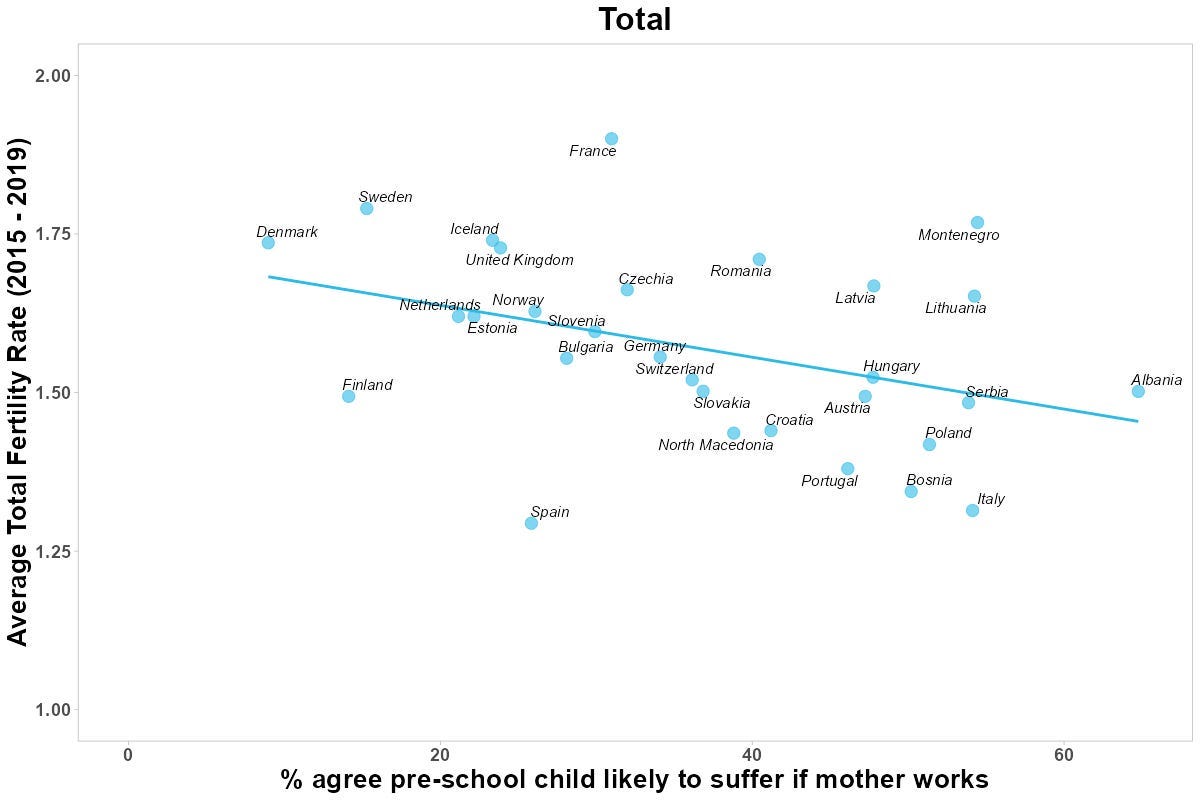Actually, social conservatism probably won't save your birth rates
The 2020s has seen the rise of a new kind of influencer – beautiful young mothers, usually with bountiful litters of children – who talk about how much they love being a stay-at-home mum.
Sarah Therese is a home-schooled Canadian Christian fundamentalist and YouTuber, she’s under thirty and has five children. Classically Abby (Ben Shapiro’s sister) makes a series of half political, half lifestyle content about motherhood and “classic living”. She talks about how being a parent is your duty and without parenthood you are wasting your life. Hannah or @ballerinafarm is a retired ballerina and mother of seven, who quit her “city career” to run a farm with her husband and run in beauty pageants. The internet is full of them.
(Of course, all of these women work from home but they are not “stay-at-home mothers”. They are, in fact, professional influencers. Sarah Therese’s husband even quit his job to help her business.)
These women present an appealing and maybe even plausible answer to the birth rates issue. What if, to save humanity, we had to turn our backs on modernity and enjoy a simple life? What if men had to provide and women had to stay at home and act feminine? What if the answer lies in homemade bread and floral dresses.
If you’re of a conservative inclination, you probably want to believe that in the 1960s we invented casual sex and ‘career women’ and now Western civilisation is paying for it with a high dependency ratio and a shrinking native population.
This seems intuitively true. Historically, in Western society, women had fewer socially acceptable life paths. You could be a wife and mother, and your status was affected by how good you were at those things. Maybe, you could be a nun if that really wasn’t for you. Otherwise, you probably had to be a prostitute or an eccentric, unloved spinster.
Now, many of the most widely respected women don’t have children. In fact, it’s probably higher status for a woman to excel in a profession than it is for her to have three kids and raise them well. And, if she has these children, and puts in the effort, then she will harm her chances at excelling in that status-accruing career. Basically, the lesson of the last few decades is that women can’t have it all – and sometimes the thing they choose to give up is motherhood. (This is basically the underlying message of the Barbie movie.)
On an intra-national level, this theory holds up. Republicans have higher birth rates than Democrats.
But, strangely, on an international level, countries with conservative values do not have higher birth rates. My friends at the Boom campaign have written about how “family values”, as found in the European Values Survey, and TFR have a surprising correlation. More conservative values, like believing that one has a duty to society to have children, are held in countries with lower birth rates.
These are weak correlations but are certainly worth further thought.
In my next few blogs I’m going to see if the same trend exists for OECD countries and if it exists between states in the US. Even if this trend doesn’t hold up globally or within the US, I don’t want to minimise this result. I think it is incredibly surprising that socially conservative beliefs have little or no impact on nation-wide birth rates.
Does it mean that when women don’t feel obligated to be mothers, they want to do it more? Does it mean that more socially liberal countries compensate parents more, because they don’t feel that people are naturally obligated to provide for the next generation? Or does it mean that the more important we think motherhood is, the more difficult it becomes, and so these women have fewer children?
And if it’s not a shift in values, then why do increases in a country’s wealth cause its birth rate to fall anyway?






You have to look at this trend over time and within specific populations as well. While socially liberal Sweden has a higher birth rate than socially conservative Poland, you’ll probably find that socially conservative Swedes (including of non native origin) have a higher birth rate than social liberals. If you do a longitudinal study on any population up to the baby boom you’ll probably find similar results. I think that makes it clear the social attitudes are not sufficient causes. Understanding the causes of the baby boom might be interesting however as it happened across geographies and in a specific context from which you can extrapolate.
https://worksinprogress.co/issue/understanding-the-baby-boom
In addition it might be interesting to see birth rate differences in similar populations living under different contexts such as east and west Germany.
An extreme counter example here is the wealthy East Asian countries, which are far more socially conservative than European or North American countries in general and also have rock bottom fertility rates.